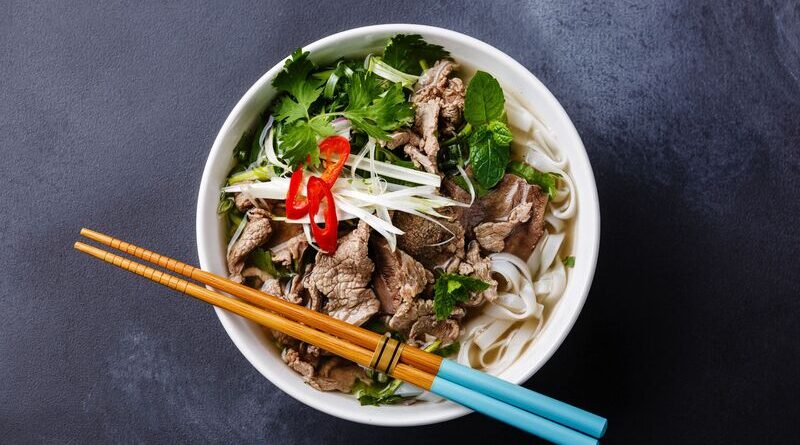Discovering Pho’s Health Secrets: Is Pho Healthy?
Is Pho healthy? With the increasing global popularity of this renowned Vietnamese meal, this question comes up frequently. We’ll examine the nutritional features of pho in this article, including its components, advantages for health, and possible disadvantages. Whether you’re a dietitian or a newbie to this tasty soup, knowing the health risks associated with pho will help you make wise food choices. Let’s find out the real reason why pho is considered healthy.
Nutritional Profile of Healthy Pho
Pho has a well-balanced nutritional profile, with each of its constituents providing a range of health advantages. The broth gives collagen and vital amino acids; it is usually cooked with bones and spices. While protein from beef or tofu maintains muscular health, rice noodles provide a gluten-free supply of carbohydrates.
Vitamins, minerals, and antioxidants are added by toppings such as fresh herbs and veggies. On the other hand, a lot of toppings might raise the amount of calories consumed, and commercial broths might have high sodium content. The secret to maximizing the healthfulness of pho is moderation and ingredient selection.
Health Benefits of Healthy Pho Ingredients
The components of pho have several health advantages:
Bone Broth:
Bone broth, high in collagen and amino acids, promotes gastrointestinal health, skin suppleness, and joint health.
Rice Noodles:
Rice noodles are low in fat and gluten, and they give you consistent energy without raising your blood sugar.
Lean Protein:
The protein sources in pho, such as beef, chicken, high protein fish, or tofu, provide vital nutrients for the immune system and muscle restoration.
Fresh Herbs and Vegetables for Healthy Pho:
Vegetables and herbs, which are abundant in vitamins, minerals, and antioxidants, strengthen the immune system and reduce inflammation.
Potential Drawbacks of Pho
Although pho is favored for its depth of flavor and cultural significance, there are a few possible downsides. Among them are:
High Sodium Content:
Commercially made pho broths and seasoning packets frequently have high sodium content, which, if taken in excess, can lead to hypertension and other health problems.
Calorie and Carbohydrate Content:
Pho can be heavy in calories and carbs, especially when it’s piled high with noodles and greasy toppings. For those who are watching their consumption of calories or carbohydrates, this could present difficulties.
Potential Allergens:
Common allergies included in pho include wheat (in the form of noodles), soy (found in tofu), fish (found in seafood-based versions), and tree nuts (found in peanut-based garnishes). Those who are allergic to certain foods should exercise caution when eating pho.
Added Sugars and Unhealthy Toppings:
Some pho versions could have harmful toppings like fried shallots or fatty beef cuts, as well as sauces or condiments with added sugar. These additions may raise the fat and calorie content without adding much nutritional benefit.
Pho Variations and their Health Implications
There are numerous regional and cultural versions of pho, each with its own distinct flavors and health benefits.
Beef Pho (Pho Bo):
Classic and high in protein, however, be wary of the amount of saturated fat.
Chicken Pho (Pho Ga):
A less fattening and lighter alternative to beef pho.
Seafood Healthy Pho:
Supplies omega-3 fatty acids, but watch out for sensitivities to shellfish.
Vegetarian or Vegan Healthy Pho:
Suits vegans and vegetarians and provides plant-based protein.
Low-Sodium Healthy Pho:
To reduce sodium intake, choose low-sodium choices or homemade broth.
Gluten-Free Pho:
Using rice noodles, this dish is perfect for anyone who is sensitive to gluten.
Healthy Pho and Dietary Restrictions
A flexible dish that can meet a variety of dietary requirements is pho:
Gluten-Free:
Rice noodle pho is naturally gluten-free, so people with celiac disease or gluten sensitivity can enjoy it.
Vegan or Vegetarian:
If you replace the beef in pho with tofu or veggie broth, it can be made vegan.
Low-Sodium:
Use low-sodium broth and cut back on salty condiments like fish sauce to lower the sodium level.
Allergen-Free:
Make pho your own by substituting other components for common sensitivities like soy, shellfish, or nuts.
Tips for Making Healthy Pho Choices
Take into account these suggestions for a healthier dining experience when you love pho:
- To cut back on sodium, go for low-sodium choices or homemade broth.
- For extra fiber and nutrients, load up on veggies like bok choy and bean sprouts.
- Reduce your intake of saturated fat by choosing lean protein sources like tofu or poultry.
- To limit calories and prevent overindulging, pay attention to portion sizes.
- To cut back on extra calories and bad fats, use light sauces and fried shallots as your only additional garnishes.
- Use condiments sparingly to avoid additional sugars and sodium, such as hoisin sauce and Sriracha.
- Use whole grains for extra nutritional value and fiber, such as brown rice noodles.
- For best results, drink water or herbal tea with your pho to be properly hydrated.
Conclusion
In summary, pho has many nutritional advantages, such as its rich broth, lean protein, and an abundance of fresh herbs and vegetables, but it’s important to be aware of certain disadvantages including excessive sodium levels, calorie density, and allergies. People can enjoy pho as a tasty and nutritious meal alternative by making educated decisions, such as choosing homemade or low-sodium broths, lean protein, and vegetable toppings, and altering ingredients to suit dietary constraints. Ultimately, the secret to optimizing the healthfulness of this well-liked Vietnamese cuisine is moderation and careful component selection.
You Can Read More About Healthy Things
Is Couscous Healthy? Exploring its Nutritional and Versatility
Unlocking Corn’s Surprising Secrets: Is Corn Healthy?
